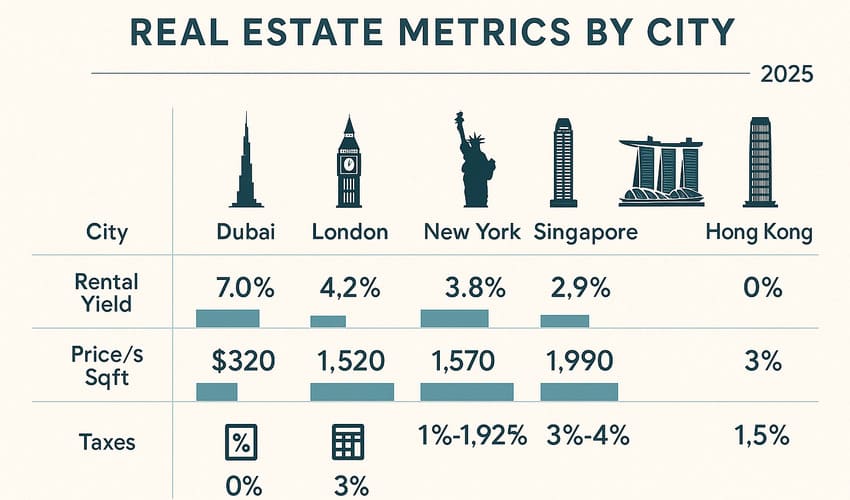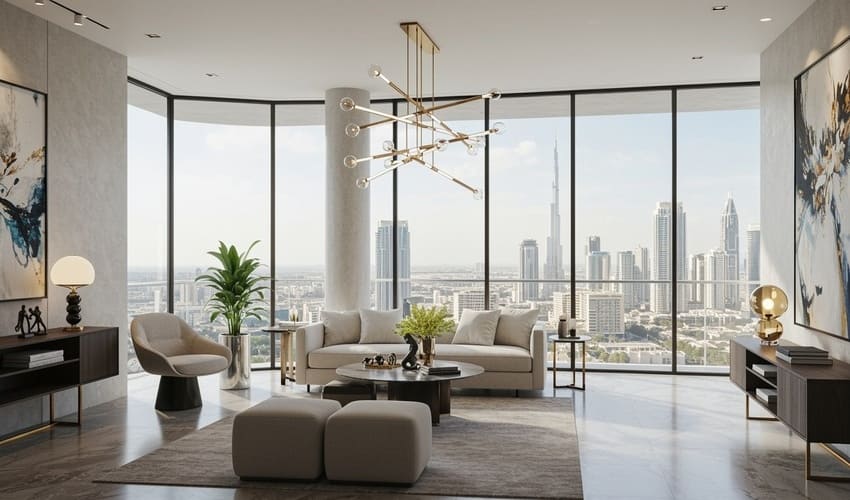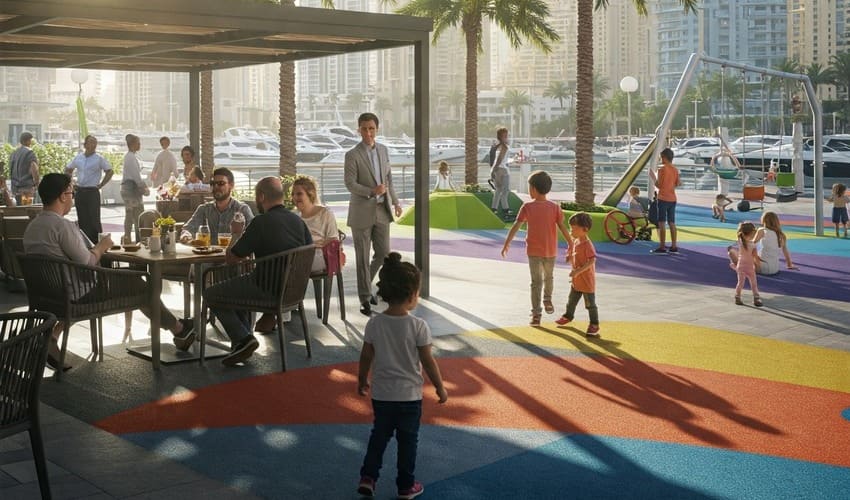The global search for prime real estate investment destinations is a constant quest. For decades, cities like London, New York, Singapore, and Hong Kong have been the titans, the established safe havens for capital. But in 2025, a dynamic contender isn’t just knocking on the door – it’s reshaping the entire landscape: Dubai.
Forget the outdated perceptions. Dubai’s real estate market has matured into a global powerhouse, offering a unique blend of high returns, investor-friendly policies, and an unparalleled lifestyle that consistently draws international attention. Dubai’s real estate market stands out as a global hub, recognized for its rapid growth, strong demand, and stable investment environment. If you’re conducting a global real estate market comparison, looking beyond the traditional choices is crucial. This analysis pits Dubai vs other real estate markets, highlighting the tangible advantages that make Dubai real estate investment 2025 a compelling proposition. Dubai’s residential market, in particular, demonstrates robust performance and resilience compared to other global hubs. From tax efficiencies to residency pathways and sheer value for money, let’s explore why Dubai is not just competing, but often winning. The future of Dubai real estate looks promising, offering long-term investment security and growth potential for both investors and residents.
Investment Metrics: Where Dubai Delivers More Bang for Your Buck

When it comes down to the numbers, Dubai presents a compelling financial case that’s hard to ignore, especially when benchmarked against its global peers.
A. Rental Yields: Outperforming the Giants
For buy-to-let investors, rental yield is king. And in this arena, Dubai reigns supreme. Average gross rental yields in Dubai consistently hover between 5% and 9%, with some reports citing averages of 7% or even higher in specific segments like properties near top schools (8-12%) or certain apartment types (studios at 6.68%, hotel apartments 7-9%). Prime residential properties averaged a healthy 5.3% yield in 2024. High rental yields make Dubai especially attractive for investors seeking strong returns and long-term growth.
Now, let’s look at the Dubai rental yield vs London/New York comparison:
- London: Typically offers yields around 2-4%, with specific reports citing 2.4% or 3.4%.
- New York: Generally yields 3-5%, with figures like 3.7% or 4.2% often quoted.
- Singapore: Yields are around 3-4%, sometimes cited as 3.5%.
- Hong Kong: Offers the lowest yields, typically 2-3%.
The difference is stark. Dubai often delivers double or even triple the rental returns achievable in these established markets. Investors benefit from higher rent and rising rents, which boost rental income and reflect strong market trends. Why? A combination of relatively affordable property prices and strong, consistent rental demand driven by a large expatriate population (around 90% of residents).
B. Property Price Appreciation: Growth Where Others Stagnate
Dubai’s property market hasn’t just offered strong yields; it’s also delivered impressive capital growth. While the explosive post-pandemic surge might be moderating, the outlook for 2025 remains robustly positive. Residential sales prices were up nearly 20% year-on-year as of August 2024, with luxury properties seeing significant gains. Rental prices have also climbed, and these price increases are driven by high demand and limited supply.
Crucially, forecasts for 2025 predict continued growth for Dubai, setting it apart:
- Dubai: Forecasts range from +5% (Knight Frank) to +8-9.9% (Savills) for prime properties, and potentially 5-8% overall.
- London: Forecast at +2%.
- New York: Forecast at +3%.
- Singapore & Hong Kong: Both forecast at 0% growth.
The 20% year-on-year increase is significant, reflecting Dubai’s strong market fundamentals and investor confidence.
While the global average prime market growth is expected to slow, Dubai is projected to lead the pack. This sustained momentum is fueled by factors like the influx of high-net-worth individuals (HNWIs), limited supply in key segments, and supportive government initiatives. The market is on an upward trajectory, with sustained growth and sustained demand across residential and rental sectors.
Dubai’s performance is further supported by high rental yields, low interest rates, and proactive government policies, all of which underpin ongoing market strength.
Dubai is set to maintain its leadership position, with conditions favoring further growth and stability in the coming years.
The pace of new supply is struggling to keep up with robust demand, which continues to drive both prices and rents higher.
Market activity remains at record levels, with transactions and transaction volume marking historic highs and underscoring Dubai’s dynamic real estate sector.
C. Affordability: Getting More Square Feet for Your Money
Despite its luxurious image, Dubai offers surprising affordability compared to its global counterparts. Average prices per square foot are significantly lower:
- Dubai: ~$566/sq ft (other estimates range from $300-$550/sq ft )
- London: ~$1,892/sq ft (or ~$1,200/sq ft )
- New York: ~$1,668/sq ft (or ~$1,500/sq ft )
- Singapore: ~$2,057/sq ft (or ~$1,200-$1,450/sq ft )
- Hong Kong: ~$2,453/sq ft (or ~$2,000/sq ft )
This means your investment dollar stretches much further in Dubai. For $1 million, you could acquire around 91 square meters (approx. 980 sq ft) of prime space, significantly more than in London, New York, Singapore, or Hong Kong. This accessibility opens the door to a wider range of investors.
D. Taxation: The Unbeatable Tax-Free Property Investment Dubai Advantage
This is arguably Dubai’s trump card. The emirate boasts a remarkably investor-friendly tax regime.
No Annual Property Tax: Unlike London, NY, Singapore, and HK.
No Income Tax on Rental Earnings (for individuals): A major boost to net yields.
No Capital Gains Tax on Sale: Keep all your profits upon resale.
No Inheritance Tax: Easier wealth transfer.
The primary cost is the one-time 4% Dubai Land Department (DLD) transfer fee. Compare this to London’s Stamp Duty, Council Tax, income tax, and capital gains tax , New York’s property, income, capital gains, and potential mansion taxes , Singapore’s hefty 60% Additional Buyer’s Stamp Duty (ABSD) for foreigners plus annual property tax , or Hong Kong’s Buyer’s Stamp Duty and property taxes. Dubai’s tax efficiency significantly enhances ROI.
Investor Visas: A Golden Ticket to Residency
Dubai actively encourages investment by offering attractive residency pathways linked to property ownership, most notably the Golden Visa.
Dubai Golden Visa: A minimum real estate investment of AED 2 million (approx. $545,000) makes you eligible for a 10-year renewable visa. Crucially, this applies to ready and off-plan properties Dubai from approved developers, and even mortgaged properties can qualify under certain conditions. A lower threshold of AED 750,000 (approx. $204,000) can secure a 2-year visa. The Golden Visa is especially appealing to end users—individual buyers seeking long-term residency and security—who want to move from renting to owning their homes.
Global Comparison: This contrasts sharply with other hubs. The UK’s Tier 1 Investor visa is closed. The US EB-5 program requires a higher investment ($800k-$1.05M) and the creation of 10 jobs. Singapore’s Global Investor Programme needs a much larger investment (S$2.5M+) in specific business sectors, not residential property. Hong Kong’s new CIES requires HKD 30M (approx. $3.8M) and excludes residential real estate.
Dubai’s Golden Visa offers a relatively low threshold, direct linkage to desirable real estate, long duration, and simpler requirements, making it a powerful incentive.
Purchasing Structures: Flexibility That Fuels Investment

Dubai’s market, particularly the off-plan segment, offers purchasing flexibility rarely seen elsewhere. Off plan developments play a crucial role in the market, providing investors with early access to innovative projects and long-term growth opportunities.
Off-plan properties Dubai account for a significant portion of sales (over 60% in 2024), driven by developer incentives.
Flexible Payment Plans: Developers commonly offer attractive plans like 60/40, 50/50, or even 1% monthly payments, often extending post-handover. This significantly lowers the barrier to entry compared to needing large upfront sums or immediate mortgages. These options are especially appealing due to the growing demand for accessible and flexible homeownership. Buyer funds are also protected via mandatory DLD-regulated escrow accounts.
Global Contrast: London, New York, Singapore, and Hong Kong typically rely on traditional mortgages with higher upfront costs and less developer-driven flexibility.
Example in Action: Consider Sereno Residences, a project by Svarn Development in the popular JVC area. JVC is an emerging hotspot, attracting buyers and investors seeking growth potential. Offering modern 1-, and 2-bedroom units, it features payment plans like pay 20% on booking, 32% payable till 2026 and 48% post handover at 1% monthly till 2030. This makes acquiring a quality property in a growing community significantly more accessible. Sereno Residences exemplifies the appeal of master planned communities, which integrate residential, retail, and recreational spaces for a connected lifestyle.
Ongoing new supply is helping to address market demand, but continued development is needed to achieve full market balance.
Lifestyle and Infrastructure: The X-Factor

Beyond the spreadsheets, Dubai’s overall environment is a major draw.
Quality of Life & Safety: Dubai consistently ranks high for safety and offers a high quality of life. While globally expensive, its cost of living is often more favourable than Hong Kong, Singapore, London, or New York according to Mercer’s 2024 data. Integrated living in Dubai provides unmatched convenience, with residents enjoying easy access to amenities, retail, leisure, and transport options.
World-Class Infrastructure: State-of-the-art airports (DXB is world’s 2nd busiest overall ), efficient transport, advanced digital connectivity, and ongoing development projects (Dubai 2040 Urban Master Plan ) create a seamless living and business environment. Major infrastructure projects continue to drive Dubai’s long-term urban development and reinforce its position as a global property hub. The city’s focus on sustainability is evident in its smart city initiatives and eco-friendly urban planning, supporting environmentally conscious growth. Infrastructure and shared amenities are constantly enhancing residents’ lifestyles and increasing the investment value of properties.
Expat Haven: With ~90% of the population being expatriates , the city is inherently international. Excellent international schools, high-quality healthcare, and endless leisure options cater specifically to a global community. Planned and integrated communities play a vital role in shaping Dubai’s urban landscape, offering residents vibrant, well-connected neighbourhoods. The growing population continues to drive demand for new developments and supports the city’s dynamic real estate market. Residents benefit from easy access to a wide range of services and amenities throughout Dubai.
Why Dubai Takes the Lead in 2025
When conducting a global real estate market comparison, Dubai in 2025 presents a compelling, multi-faceted advantage. It’s not just about one factor, but the powerful synergy of several: significantly higher rental yields, an unbeatable tax-free property investment Dubai environment, greater affordability offering more value per square foot, accessible and attractive residency visas, flexible purchasing structures especially for off-plan properties Dubai, and a safe, modern, globally connected lifestyle. Dubai’s real estate market continues to thrive, demonstrating resilience and sustained growth even amid global economic fluctuations. The market’s stability is reinforced by upcoming regulatory adjustments and project completions, ensuring Dubai remains a secure investment hub. While traditional hubs face challenges like lower yields, higher taxes, affordability crises, and more complex visa routes, Dubai continues to innovate and adapt, solidifying its position. Developments like Sereno Residences by Svarn Development exemplify the opportunities available – modern living with attractive payment structures in high-demand areas. For savvy global investors looking at Dubai real estate investment 2025, the emirate offers a unique and potent combination of financial reward and quality of life that is increasingly hard to match on the world stage.
FAQs
Is Dubai real estate a better investment than London or New York in 2025?
Yes. Dubai offers higher rental yields (5–9% vs. 2–4% in London/NY), no property or capital gains tax, and strong property appreciation.
Why are rental yields higher in Dubai than other global cities?
Dubai’s property prices are relatively low, yet rental demand is high due to its large expatriate population, offering investors better ROI.
Can foreigners buy property in Dubai?
Yes. Foreign investors can purchase freehold properties in designated areas like JVC, Downtown Dubai, and Palm Jumeirah with full ownership rights.
Is Dubai’s property market expected to grow in 2025?
Yes. Analysts project a 5–9% price increase for prime properties, supported by limited supply, high demand, and investor-friendly policies.
What is the Dubai Golden Visa and how can property buyers qualify?
The Golden Visa grants 10-year residency for property investments of AED 2M or more. AED 750K can get a 2-year visa, even with a mortgage.
Are there property taxes or capital gains taxes in Dubai?
No. Dubai has no annual property tax, no capital gains tax, and no income tax on rental earnings, significantly improving net returns for investors.
What makes off-plan property attractive in Dubai?
Off-plan units offer flexible payment plans, lower entry prices, and capital appreciation. Buyers also benefit from DLD-regulated escrow protection.

